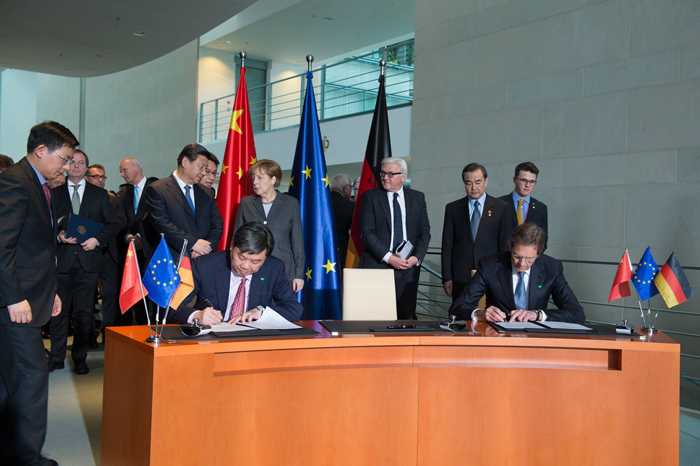SAIC Motor, Volkswagen cooperate on fuel cell and hybrid tech

China’s President, Xi Jinping, and Germany’s Chancellor, Angela Merkel, were on hand, in Berlin, to witness a signing ceremony involving SAIC Motor Corp’s president, Chen Hong, and the Volkswagen Group’s China president and CEO, Jochem Heizmann, on March 28, covering cooperation in fuel cell technology and the Shanghai Volkswagen joint venture’s plug-in hybrid cars.
SAIC Motor has long been undertaker part of China’s fuel cell R&D, which is a key program in technological innovation for the new energy car industry. In May 2011, its plug-in fuel cell car was second only to Toyota and Audi at a fuel-cell rally, the 11th Michelin Challenge Bibendum, in Berlin.
And, in April 2012, its fuel cell cars were the only Chinese new energy cars on display at the Hannover (Germany) Fair, the world's leading site for industrial technology.
Now, SAIC Motor has partnered with Volkswagen for international cooperation on hydrogen energy infrastructure and fuel cell standards. To help its China joint venture, Shanghai Volkswagen, seize the opportunities in new energy vehicles, it cooperated with the Volkswagen Group (China) to develop plug-in hybrid technology suitable for the Chinese market to develop a plug-in hybrid that meets Chinese market’s needs.
SAIC Motor’s Roewe 550 plug-in hybrid is already on the market and its fuel consumption of 2.3 liters/100 km and range of 500 km per charge mean the Chinese can keep pace with the world’s most advanced plug-in hybrid power technology. SAIC Motor announced its first generation fuel cell vehicle, the Phoenix, in 2001, and since then has worked on mass production of new energy cars.
It has developed more than 20 new energy vehicles - pure electric, hybrid, fuel cell, super capacitor, CNG and methoxymethane – in the sedan, passenger van, and bus sector and its Roewe 750 hybrid, Roewe E50 pure electric and Roewe 550 plug-in hybrid are in mass production.
As the Shanghai World Expo of 2010 and its many customers have long shown, SAIC Motor’s new energy vehicle technology is reliable and the company will continue its industrialization of pure EVs and hybrids, technological upgrades, research, and applications of fuel cell vehicles. Through its fuel-saving, alternative energy strategies, SAIC Motor will improve the fuel economy of its products and contribute to the “Beautiful China” vision.

